Category: Customer service
Posted by Dr. El - September 2, 2015 - Business Strategies, Communication, Customer service, Engaging with families, McKnight's Long-Term Care News

Here’s my latest article on McKnight’s Long-Term Care News:

A study about rudeness in the medical journal Pediatrics got me thinking about the possible effects of rudeness in long-term care.
In “The Impact of Rudeness on Medical Team Performance: A Randomized Trial,” teams were subjected to rude comments by a supposed visiting medical colleague. For example, he suggested that the team members in the neonatal intensive care unit (NICU) “wouldn’t last a week” in his country.
Compared to the control group, teams that had been exposed to the rude comments had lower diagnostic and procedural performance scores.
Naturally, I wondered how this research might translate to senior living.
I’m sure I’m not the only person who has observed rudeness occurring in eldercare settings, whether it’s an administrator being curt with staff, nasty remarks between staff members, a discourteous statement to or from a resident, or a sharp comment by a family member.
To complicate matters, LTC teams are often multi-cultural. What’s considered reasonable for one culture may be deemed rude by another culture.
In addition, a comment can be interpreted differently depending on the ages and genders of the people involved. If an older female staff member compliments a young woman on her outfit, it can come across differently than if an older male staff member similarly compliments his young female colleague.
Long-term care is also very hierarchical. Doctors often “get away with” rude comments to nurses, as do administrators with underlings.
The research, however, suggests that nobody is getting away with anything. Rude statements negatively affect team performance in the NICU and, I suspect, in teams everywhere.
The good news is that the study found two behaviors reduced the impact of rudeness: information sharing lessened the negative impact of rudeness on diagnostic scores and help-seeking reduced the adverse impact of rudeness on procedural performance scores.
Here are some ways to address rudeness in LTC:
For the entire article, visit:

Posted by Dr. El - July 29, 2015 - Customer service, Inspiration

During a recent senior living conference, I was staying at the well-appointed Embassy Suites in Norman, Oklahoma. The key card to open the room came in a small folder. When I took out my key I found a statement on the folder that struck me as being completely relevant to long-term care and an excellent way to view senior living residents:
Our Guest
You are the most important visitor on our premises. You are not dependent on us. We are dependent on you. You are not an interruption to our work. You are the purpose of it. You are not an outsider to our business. You are part of it. We are not doing you a favor by serving you. You are doing us a favor by giving us the opportunity to do so.

Posted by Dr. El - May 18, 2015 - Business Strategies, Customer service, Depression/Mental illness/Substance Abuse, Engaging with families, Motivating staff, Talks/Radio shows
Join Dr. El
Wednesday, May 20th
at 2pm Eastern Time (1pm Central Time)
for a
FREE Webinar on
9 Ways to Improve the Effectiveness of your Social Work Department
& Increase LTC Resident Satisfaction
sponsored by EmLogis
To register:
About the webinar:
Are your residents depressed, their families distressed, and your staff turnover rate higher than you’d like? Empower your long term care social service department to lead the way to change! Join LTC expert and psychologist Dr. Eleanor Feldman Barbera for a live webinar on Wednesday, May 20, 2015 at 1pm CDT | 2pm EDT as she discusses the importance of social workers and ways in which an effective department can transform your community.
What you will learn:
The most important factors contributing to resident satisfaction
The impact of social workers upon resident, family and staff satisfaction
9 easy-to-implement strategies to develop your social work department
Who should attend this webcast:
Administrators and assistant administrators
DONs, ADONs, social workers
Staff training coordinators
Human resource department staff
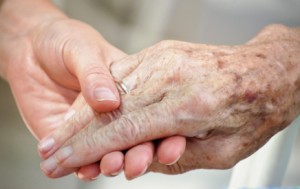
Posted by Dr. El - January 21, 2015 - Customer service, End of life, McKnight's Long-Term Care News, Personal Reflections, Resident care
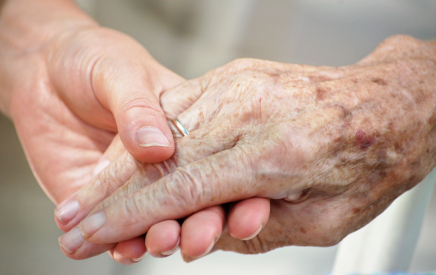
Here’s my latest article on McKnight’s Long-Term Care News:

There are moments in life that engender important questions. When an individual is born, we ask, “Is it a boy or a girl?” When the person dies, we ask, “What happened?” In long-term care, we’re not around for the first question, but we often are for the second.
Though infrequently observed by those not involved with direct care, how someone dies is a very important part of the culture of the long-term care organization.
In “Remembering the Lost,” New Old Age blogger Paula Span reports on the typical experience of loss in LTC, where deaths are often barely acknowledged. She describes two alternative programs that offer a way to recognize individuals who have lived and died in LTC.
In “Better death notifications could improve CNA work experience, study suggests,” McKnight’s notes that how the deaths of residents are communicated to CNAs affects the way they feel about their work. The best way to find out, the study concludes, is to be told prior to beginning a work shift. The hardest way to learn of a death is to arrive at the resident’s room and find it emptied of belongings or filled with a new resident.
A front-line perspective
Like others performing direct care, I’ve had to cope with the loss of residents. I felt sucker-punched by the deaths that occurred early in my LTC career. My youth, inexperience, denial, and lack of training in issues around death made the demise of very ill or very old residents seem sudden and shocking.
I quickly got some training in thanatology (the study of death) and I’ve had many years of experience since then. I learned to protect my heart and love with a little cushion of distance around me.
Echoing the findings of the study referred to above, my worst experience by far was coming in to work to find the room empty of a beloved patient, the bed stripped and raised as high as possible after the mattress had been cleaned. By contrast, once an aide rushed to me the moment I got off the elevator to visit one of my patients, telling me she’d passed the night before. I thanked her profusely, hurried to the bathroom and cried.
My rituals around loss do still occasionally involve crying in the bathroom, but more often since I learned to protect my heart I look upward and say, “Rest in peace, John.” Or Mary. Or Viola. Sometimes I talk with other staff members who were close to the resident. Or I write about the person who died.
Creating better ways to address losses in LTC
My personal rituals were developed in the absence of formal, facility-sanctioned acknowledgement of the deaths of residents. As a shrink, I was aware of the need to get training and to recognize the personal impact of these losses.
I suspect that many new staff members don’t make it past the “sucker-punch” phase of losing residents. Instead, they quit, so that new staff members must be hired and trained. For ideas on how to reduce this likelihood, read Absenteeism and turnover in LTC? Death anxiety could be the cause.
Facilities can improve the experience of death and dying for the residents, staff and family by addressing various aspects of the process such as:
For the entire article, visit:

Posted by Dr. El - December 17, 2014 - Customer service, Engaging with families, For Families, Tips for gifts, visits
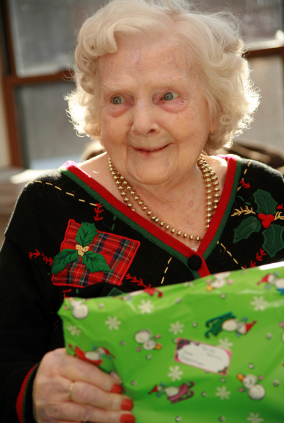
This post, along with my Planning for the Holidays article, could be printed out and left for family members in a prominent location. Think of it as your gift to every nursing home family.
~Happy Holidays from Dr. El at MyBetterNursingHome.com

With the holiday season upon us, you may be wondering what would make a good present for a relative in a nursing home. In my efforts to banish the barren nursing home room, photos are still my number one pick for holiday gifts, but here are other suggestions (be sure to label everything!):
Nice lotions, soaps, and grooming products
A special bedspread
A “lap” blanket to wear while sitting in a wheelchair
Wheelchair accessories (Google it) like cup holders, side pockets, wheel lights, etc.
Sturdy clothes that can handle being washed in an industrial washing machine
Colorful bangle bracelets to blend in with nursing home wrist bands
My book, The Savvy Resident’s Guide: Everything You Wanted to Know About Your Nursing Home Stay But Were Afraid to Ask
Plants, or potted flowers, especially if you can come by to water them regularly
Great gifts from the heart:
Make a commitment to visit once a week, or once a month
Make a commitment to call once a week, or once a day
Organize friends and family so that each person has a week to call or visit
Bring a home-cooked meal
Organize friends and family to bring a home-cooked meal on a regular basis
Posted by Dr. El - December 11, 2014 - Business Strategies, Customer service, Engaging with families, McKnight's Long-Term Care News
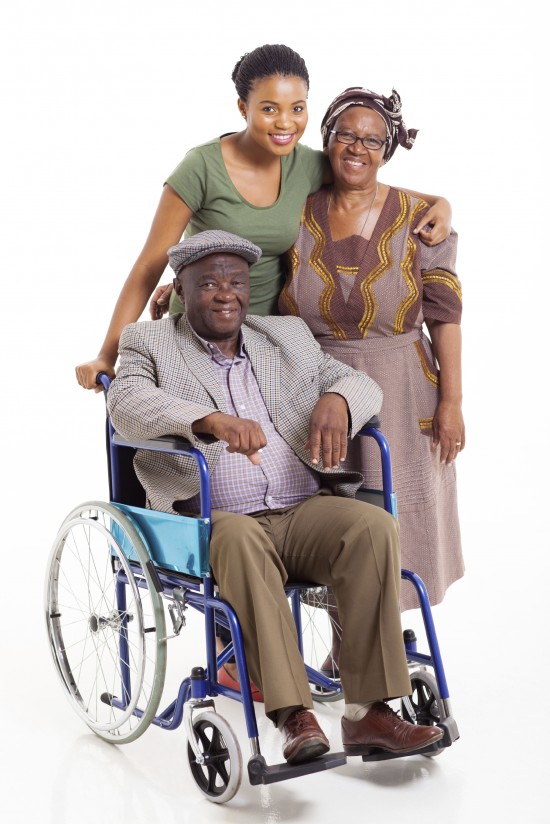
Here’s my latest article on McKnight’s Long-Term Care News:

Jane Gross’ recent post Seeing the ‘Invisible Patient’ in the “New Old Age” blog of the New York Times discusses how professionals often ignore the needs of caregivers of the elderly because they are focused on their identified patient. As the author states, “Not once in the years I cared for my mother did any of her physicians ask me how I was doing.”
While the article centers on the burdens of caregivers in the community, it got me thinking about whether we’re meeting the needs of families whose loved ones are in long-term care.
What are the burdens of family members in LTC?
Some families have been down a long road of illness with their loved one and are physically and emotionally depleted. Others have had the shock of a sudden shift in the condition of their relative and have been swiftly thrust into the world of LTC. Virtually all of the families are coming into a system that’s new for them and they could use our help in successfully navigating this change.
Benefits to the facility
Addressing the needs of family members can:
• Increase the likelihood of families making positive contributions to the lives of the residents, which is good for the residents and reduces the workload of the staff. If families are purchasing clothes, for example, that’s one less task for staff members.
• Improve satisfaction with our services and increase the chances that they’ll recommend our facility to others.
• Provide a benefit that appeals to the adult children decision-makers and makes our organization more competitive.
Below are some ways to creatively and inexpensively attend to the needs of families:
For the entire article, visit:
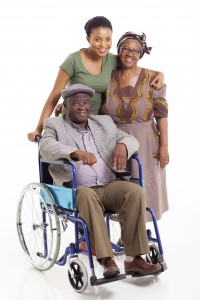
Posted by Dr. El - December 8, 2014 - Business Strategies, Customer service, Talks/Radio shows

Join Dr. El
Wednesday, December 10th
at 2pm Eastern Time (1pm Central Time)
for a
FREE Webinar on
Secrets to Creating an Emotionally Healthy Environment for Residents
sponsored by EmLogis
To register:
About the Webinar:
Is lack of attention to residents’ emotional health undermining your efforts to provide good medical care? Join psychologist Dr. Eleanor Feldman Barbera as she discusses how to create an emotionally healthy environment that enhances medical services and improves the experience of residents, families and staff.
What you will learn:
Symptoms of an emotionally unhealthy atmosphere
Elements that contribute to a healthy environment
Realistic, feasible steps toward creating an emotionally healing atmosphere
Who should attend this webinar:
Administrators and assistant administrators
DONs, ADONs, department heads, and nursing supervisors
Staff training coordinators
All direct care staff

Posted by Dr. El - October 15, 2014 - Business Strategies, Customer service, Resident care, Talks/Radio shows

Tomorrow, 10/16, I’ll be a guest on “When Things Go Wrong,” the Wharton Business Radio show of professor Christian Terwiesch. The live show is 10/16 at 4pm ET and I’ll be on at 4:30pm. Professor Terwiesch will be addressing customer services issues in long-term care. They don’t provide the questions in advance so I have no idea what he’s going to ask me, but I’ll do my best to represent psychology and long-term care while acknowledging the reality of occasional lapses in customer service.
If you want to listen live (or on-demand after the show is over), see below for a link to a 30-day free trial of SiriusXM.
I hope you’ll join us for what promises to be a very interesting discussion!
Here’s the link to a 30-day free trial of SiriusXM: http://www.siriusxm.com/freetrial
The interview will air live on SiriusXM Satellite Radio Channel 111, as well as online at SiriusXM.com. It will also be available on-demand online to SiriusXM subscribers for 30 days after the live broadcast. This trial will allow any non-subscribers to listen live online at SiriusXM.com and via the SiriusXM free mobile app. Business Radio is in the Talk and Entertainment section of the site. Please feel free to pass it along to any colleagues, followers, friends, etc.
If you would like to listen back to recent shows (or the interview afterward), you can do so by following the steps below.
Once you have the trial:
• Go to SiriusXM.com and sign in
• Click ‘Listen Online’ in top right corner
• Click ‘Shows On-Demand’
• Then search for the show by name – When Things Go Wrong
• Click on recent shows to listen

Posted by Dr. El - September 16, 2014 - Business Strategies, Communication, Customer service, Engaging with families, McKnight's Long-Term Care News

Here’s my latest article on McKnight’s Long-Term Care News:

I listened with great interest last week to McKnight’s Fall Expo talk on Pain relief: Dealing with difficult family and resident situations. Attorney Matthew J. Murer provided excellent information on how to work with families to prevent conflicts over treatment and other care issues.
Here, from a psychological perspective, are some additional ideas to prevent or reduce disagreements over care, thereby decreasing the likelihood that the situation will result in legal action.
1. Create systems that easily allow family members to be part of the treatment team.
We collect initial data from families upon admission, but there’s often more family members can and want to add to care.
Staff members may have difficulty adequately involving families because it’s not a fluid part of their workflow. Family members tend to visit in the evenings and weekends when the administrative and day shift workers are no longer in the facility, for example, and care plan meetings are held during working hours when many family members aren’t available.
Inviting relatives to meetings via secure video chat, establishing weekend or evening hours for key personnel such as social workers, and implementing a comprehensive communication system that transmits family information between shifts and departments can help.
In addition, staff members should be trained so that they’re genuinely receptive to information provided by loved ones rather than creating the impression that the family is a nuisance. (I’ve seen this!)
2. Educate families about the illnesses of their loved ones.
Many residents are given diagnoses just prior to or upon admission, but receive little information about their conditions. Similarly, family members often struggle to come to terms with new diagnoses and have many time-consuming questions to ask of staff.
They also may look for health information from less-than-reputable resources. Set up a magazine rack in the lobby with information and resources about common illnesses such as diabetes or stroke and/or add a page to your website with helpful links for families. This meets a genuine need, generates more knowledgeable conversations between families and staff, and helps to create more realistic expectations on the part of families regarding treatment and prognosis.
For the entire article, visit:

Posted by Dr. El - September 11, 2014 - Books/media of note, Customer service, Inspiration, Resident care

As a psychologist, I have the privilege of hearing the perspective of residents on a regular basis. For those of you who aren’t so lucky, here’s an insightful video by a resident of an assisted living facility. Dick Weinman, retired professor of broadcast communications at Oregon State University, author and former radio personality, provides a moving account of his experiences as a resident.
View below or click on this link: http://youtu.be/UciTFCPCivI

Dick Weinman



















